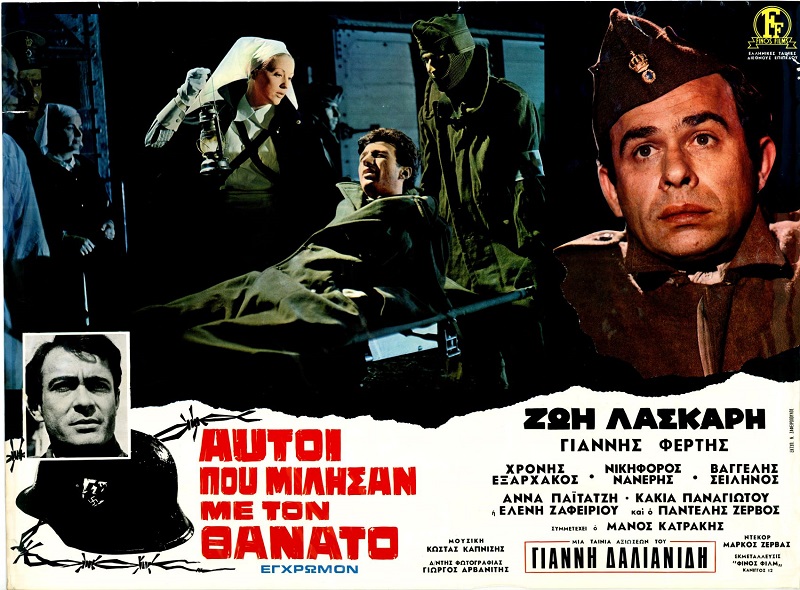Filopoimin Finos created five large color productions on the subject of the German occupation in Greece
With a difference of two years, the leading actresses Jenny Karezi and Aliki Vougiouklakis played heroines on the big screen who declared their own war against the invader, by Finos Film.
The beloved actress Jenny Karezi starred in the color production “Concerto for Machine Guns” which premiered in the cinemas of Athens-Piraeus on February 27, 1967 “cutting” 427,698 tickets in the first screening. Scripted by Nikos Foskolos and directed by Dinos Dimopoulos, the star cast included, among others, the leading Manos Katrakis and Costas Kazakos, Andreas Barkoulis, Angelos Antonopoulos and Spyros Kalogirou.
The film was the occasion for the first series of Greek television, “Unknown War (1971-1974)” directed by Nikos Foskolos, which consistently occupies the first place in television viewing history with a percentage of 83%. According to the communication manager of Finos Film, Stathis Kamvasinos “in the movie “Machine Gun Concerto” the choice of Jenis Karezis in the role of Niki was not influenced by the previous failure of the movie “He and Her”, in which she starred with Phaedon Georgitsis ». “During the filming in the Isthmus of Corinth, the star met the man of her life, Costas Kazakos, while in the gaps of the filming, playing backgammon, their relationship began, which she revealed to Dino Dimopoulos,” he said.
On October 27, 1969, the dramatic film by Dinos Dimopoulos “The teacher with blonde hair” was released in cinemas, starring Aliki Vougiouklakis and Dimitris Papamichail together with Angelos Antonopoulos and Pantelis Zervos. “It came first in receipts among 99 productions of that year, while it is the 5th most commercial film in the history of Greek cinema” said Mr. Kamvasinos.
The story of the film “Lieutenant Natassa” began immediately after directed by Nikos Foskolos. It was a blockbuster of Finos Film with many outdoor shoots in Greece, Cyprus and also in Dachau with thousands of extras and costumes. It all started when N. Foskolos, invited to a friend’s house, told the story of the film in the presence of Alice, who showed particular interest.

“But for his part he was cautious and Fino’s intervention was decisive” pointed out Mr. Kamvasinos and continued: “In the first test they did he asked her to dip her face in the muddy waters of Kopaida and when the actress did it following the he started shooting on his instructions.”
The film premiered in theaters on December 12, 1970 and set a box office record with 751,117 tickets in Athens and Piraeus. It is the most commercial film in the history of Greek cinema, a record it held until 1999, (when the film “Safe Sex” was shown).
According to the communication manager of Finos Film, “the decline of the golden age of Greek cinema had already begun, with the film being a bright exception”. “Finos was stubbornly asking for such a film to restore the prestige of cinema. That’s why he used three cinematographers for the first time in a Greek production, while the bright duo of the protagonists was, almost, the last time they worked together in a feature film” as he said. It is noted that in the movie “A Funny Girl” Dimitris Papamichael made a small appearance.
When the film was shown abroad and especially on BBC2, the producers of the musical “Evita” were convinced to give Aliki Vougiouklakis the copyright to stage it in Athens. According to the production company, Filopoimin Finos created five large color productions on the subject of the German occupation in Greece. “Machine Gun Concerto (1967)”, “Teacher with Blonde Hair (1969)”, in 1970 the films “Those Who Talked to Death” and “Lieutenant Natasha” and in 1973 “The Brave Die Twice”.

It is worth noting that the film “Those who spoke with death” with Chronis Exarchakos giving a performance recital, was an experiential film written and directed by Yiannis Dalianidis. “A tribute to his mother” underlined Mr. Kamvasinos “with Giannis Dalianidis in charge of everything”. The film with an all-star cast including Zoe Laskari, Yiannis Fertis, Nikiforos Naneris, Vangelis Seilinos, Eleni Zafeiriou and Manos Katrakis followed the resistance of a group of young people in Athens during World War II. In fact, the press ministry of the dictatorship had protested because a Russian flag was shown in the last frames of the film.




